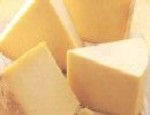
Cheddar cheese could be formulated with potassium chloride (KCl) to produce cheese with sodium levels 53% lower than standard cheddar, according to findings published in Journal of Dairy Science .
“Cheese made with [sodium chloride] NaCl + KCl [from Cargill] and NaCl + modified KCl [from Nu-Tek] were similar to cheeses made with NaCl in most respects,” wrote researchers led by Tonya Schoenfuss, PhD, from the Department of Food Science and Nutrition at the University of Minnesota.
“This indicates that KCl can be used successfully to achieve large reductions in sodium when replacing a portion of the NaCl in Cheddar cheese.”
Guidelines
The 2010 Dietary Guidelines for Americans recommend an upper limit of 2,300mg of sodium per day, and 1,500mg for those with hypertension, diabetes, or chronic kidney disease and for those considered at risk of developing these conditions, including blacks and the over-50s. This lower threshold applies to about half of the US population, according to USDA figures.
The Centers for Disease Control and Prevention says that nine in ten Americans consume too much sodium, and it estimates average intake at around 3,300mg a day.
The Minnesota-based researchers aimed to produce cheddar cheese with sodium levels of 300 milligrams per 100 grams of cheese – a significant reduction from the 640 mg per 100 g in the regular cheddar.
The sodium chloride content of cheese was reduced/replaced by using potassium chloride (KCl) from Cargill, a modified KCl from Nu-Tek Products Inc., as well as other mineral salts, including magnesium chloride (Mallinckrodt Baker Inc.) calcium chloride (Mallinckrodt Baker Inc.), and a 45% reduced-sodium sea salt (A&B Ingredients).
Results
Results showed that all the reduced sodium cheeses were more acidic than for the control, a result which indicated that “the starter culture was possibly less inhibited at the salting step by the replacers than by NaCl”.
In addition, the cheese formulated with magnesium chloride and the modified KCl were less hard than the other cheeses, while the magnesium chloride and calcium chloride cheese were described as having off-flavors like bitter, metallic, unclean, and soapy flavors.
“Cheeses containing NaCl + KCl and NaCl + modified KCl positioned closest to the control NaCl, indicating that they had sensory attributes more similar to those of the control than did the other cheeses,” wrote Dr Schoenfuss and her co-workers.
“Potassium chloride can be used successfully to achieve large reductions in sodium when replacing a portion of the NaCl in Cheddar cheese.”
The study was funded by the Dairy Research Institute, managed by Dairy Management Inc.





